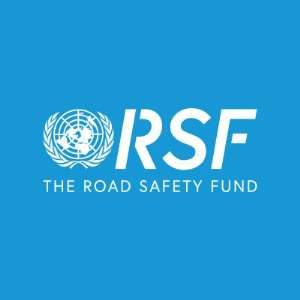
The UN Road Safety Fund (UNRSF) is launching a project to regulate the export and import of used vehicles in West and East Africa, in countries such as Cameroon, Côte d'Ivoire or Uganda. The "Safer and cleaner used vehicles for Africa" initiative will put in place requirements to ensure that participating countries only receive quality used vehicles, helping to save lives of both car drivers and other road users.
The project, implemented by the UN Environment Programme (UNEP), will develop a programme bringing exporters, mainly the European Union, the United States and Japan, and African importing countries together, to agree to adhere to a minimum level of UN regulations for used vehicles. The programme will also support African countries to develop and implement national regulations, including vehicle labelling, inspection and enforcement.
A major global challenge to road safety and clean and affordable road transport is the rapid growth of used vehicles in developing countries. The African vehicle fleet is set to grow four to five times by 2050. 80-90 per cent of this growth will come from the import of used vehicles. Today, a significant share of these imported used vehicles in Africa offer low levels of safety and environmental protection, with high associated economic costs.
Ensuring a minimum set of operational safety features leads to a 30% reduction in mortality and morbidity, according to a study of the Transport Research Laboratory looking at the impact of UN regulations on road safety. Periodic technical inspection also decreases the number of vehicles involved in fatal accidents due to technical defects by 50%. Ensuring vehicles are equipped with well-functioning equipment to reduce emissions, e.g. exhaust filters, results in emissions reductions of up to 90% (compared to vehicles not equipped with filters or equipped with non-working filters).
The main activities of the UNRSF project are to develop an action plan with used vehicles requirements, with an agreement on the minimum level of UN regulation to be observed, the enforcement of the action plans with a technical support on inspection and the establishment of a working group to develop used vehicle labelling. The project will also create awareness among stakeholders about the issues and promote a harmonized approach with regional and national communication campaigns.
The UNRSF project is being implemented while an UNEP report is published on the environmental impact of export of used vehicles to developing countries. "Used vehicles and the Environment- A Global Overview of Used Light Duty Vehicles: Flow, Scale and Regulation", the first report of its kind, calls for action to fill the current policy vacuum with the adoption of harmonized minimum level of UN regulation that will ensure used vehicles contribute to cleaner safer fleets in importing countries. The report shows that between 2015 and 2018, 14 million used light-duty vehicles were exported worldwide. Some 80 per cent went to low-and middle-income countries, with the majority going to Africa (40 per cent), followed by countries in Eastern Europe (24 per cent), Asia-Pacific (15 per cent), the Middle-East (12 per cent) and Latin America (9 per cent). A recent review conducted by the Netherlands of its exports of used vehicles found that most of these did not have a valid roadworthiness certificate at the time of the export.
Poor quality used vehicles lead to more accidents. Countries that have introduced used vehicles regulations also see safer fleets and fewer accidents. The UNEP report also shows that where countries have implemented measures to govern the import of used vehicles, notably age and emissions standards, these give them to access high-quality used vehicles, including hybrid and electric cars, at affordable prices. For example, Morocco only permits the import of vehicles less than five years old and those meeting the EURO4 European vehicles emission standard.
A number of African countries have already put in place minimum quality standards. Ghana was the first country in the West Africa region to shift to low sulphur fuels and this month has imposed a 10-year age limit for used vehicle imports.
With a total budget of nearly USD 500,000, the UNRSF project will scale the Fund’s geographical and programmatic footprint in the coming months.
The UNRSF project is implemented by UNEP, in partnership with UNECE, UNECA, WHO, The Fédération Internationale automobile (FIA), International Motor Vehicles Inspection Committee (CITA), International Transport Forum (ITF), FIA Foundation.




 Ejisu by-election: Aduomi warns NPP against voter intimidation
Ejisu by-election: Aduomi warns NPP against voter intimidation
 High Court orders implicated four NDA officials to present defence
High Court orders implicated four NDA officials to present defence
 Let’s all be matured, patriotic to have a peaceful election this year – Dampare ...
Let’s all be matured, patriotic to have a peaceful election this year – Dampare ...
 Mahama's administration saw thievery that knew no bounds; stole from market wome...
Mahama's administration saw thievery that knew no bounds; stole from market wome...
 GRA/SML deal: Always read the stories behind the headlines or you'd look stupid ...
GRA/SML deal: Always read the stories behind the headlines or you'd look stupid ...
 GRA/SML Contract: It takes some 'wild' boldness for a president to make this dec...
GRA/SML Contract: It takes some 'wild' boldness for a president to make this dec...
 Elisu By-election: "If you call yourself a man, boo Chairman Wontumi again" — Bo...
Elisu By-election: "If you call yourself a man, boo Chairman Wontumi again" — Bo...
 Fuel tanker driver escapes with his life after tanker goes up in flames near Suh...
Fuel tanker driver escapes with his life after tanker goes up in flames near Suh...
 Uniform change: ‘Blue and white are brighter colours’ — Kwasi Kwarteng explains ...
Uniform change: ‘Blue and white are brighter colours’ — Kwasi Kwarteng explains ...
 MoE not changing all public basic school uniforms but only newly built ones — Kw...
MoE not changing all public basic school uniforms but only newly built ones — Kw...
